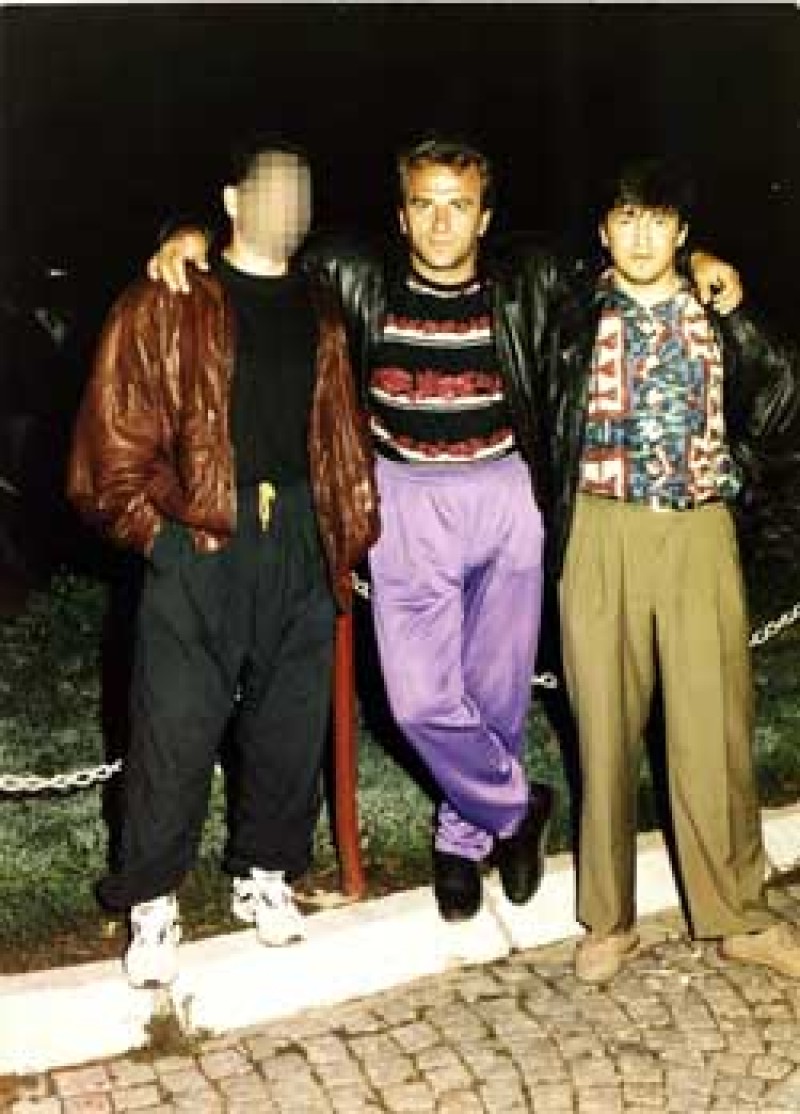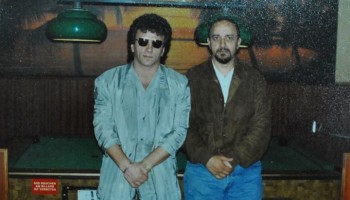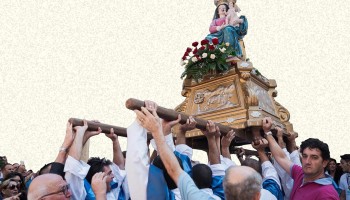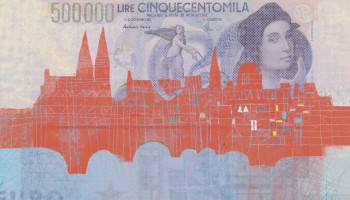It is not clear why the report was generated or what it was used for. No sources officially verified the authenticity of the report, as is common with intelligence files, but neither would anyone declare it inauthentic. OCCRP and CINS collected dozens of company and court records from Austria, Bulgaria and Serbia, and talked with at least 19 sources from politics, law enforcement, diplomacy and the criminal world to confirm details in the report. OCCRP found no provable inaccuracies. Because of the extreme sensitivity of the issue, no source would talk on the record.
Mafia Ties
The report paints a picture of Tončev as having long-time relationships with the underworld in Austria and Serbia.The report said Tončev met with at least five major organized crime figures mostly during his time as a government official. CINS/OCCRP was able to find two additional meetings: one is documented in a photo showing Tončev and a sixth crime figure and a second is documented in records of an Austrian company Tončev and a seventh crime figure shared.
Tončev, in a four-hour conversation with reporters, denied the report’s characterization of him as close to criminals. He admitted meeting some of the men but said none of the meetings were significant or he was unaware they were involved in crime.
The Advisor and the Mobster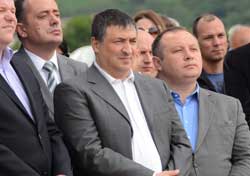 National Security Advisor Ivica Toncev attends an event.
National Security Advisor Ivica Toncev attends an event.
Tončev was an unusual choice for Dačić as an advisor because he had no political experience, no governmental experience, no security experience, and no experience working on public policy issues.
In February OCCRP and CINS revealed that Tončev was a partner in the Austrian company Fil-Šar with Montenegrin mafia don Branislav Šaranović, a connection not mentioned in the report. Šaranović was known in law enforcement circles as an important figure tied to Group America, a low-profile but prosperous Montenegrin cocaine smuggling group. After escaping from a German jail, Šaranović became a casino owner who regularly met with crime figures but CINS/OCCRP could find no evidence he was engaged in criminal activities during this time. In 2009 he was gunned down in Belgrade in a mob style hit by a crew of killers carrying automatic weapons.
Tončev said he sold Šaranović a construction company in 2006. Documents show he stayed on as a director of the company resigning only in 2009 well after he became a government advisor. Tončev said he was not a partner but rather served as director in name only because Šaranović needed someone who lived in Vienna to pick up the company’s mail. CINS filed information requests of the Serbian government asking for basic documents relating to his appointment and no request was ever answered.
The intelligence report said Tončev also had ties to crime figures Milutin Marković, Rodoljub Radulović and Nenad Milenković.
A Questionable Business Partner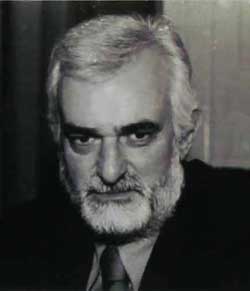 Montenegrin god father Branislav Saranovic one was a business partner of Ivica Toncev.
Montenegrin god father Branislav Saranovic one was a business partner of Ivica Toncev.
OCCRP and CINS found records in the Austrian business registry showing that Tončev formed a construction company called O.T.O. in January 1997 in Vienna. One year later, Milutin Marković became his partner in the company.
According to the intelligence file, Marković is tied to the international drug trade and has a “close connection”to drug lord Dragoslav Kosmajac. Two police sources confirmed this.
“During May 2010 there were registered contacts between Tončev and Milutin Marković, called ‘Puta’, who is engaged in the international distribution of drugs, and has close ties to Dragoslav Kosmajac,” the report states. At that time, Tončev was the adviser for European integration to Dačić, who was then minister of interior.
Kosmajac is, according to a police report, court testimony, media reports and police sources, alleged to be one of largest cocaine smugglers in Serbia and Western Europe, but OCCRP and CINS could find no evidence he has ever been arrested or charged for criminal activity.
According to the 2001 Serbian White Book on organized crime, an internal police document used to track suspected criminals, “Kosmajac is tied to drug smuggling groups in South America, from where he ships large amount of cocaine to Europe,” but he also traffics heroin from Turkey, Bulgaria and Macedonia to Europe. He “never personally comes in contact with drugs or directly with persons who smuggle them,” the report says.
The White Book says Kosmajac allegedly hired Ljubiša Buha and Dušan Spasojević, former leaders of Serbia’s two most powerful crime groups– the Surčin and Zemun drug gangs. Two former members of the Zemun gang – Dejan Milenković Bagzi and Aleksandar Simović – confirmed in court statements reported in the media that Kosmajac was supplying drugs to the Surčin gang.
Marković left the company he owned with Tončev in July 2001 and it was shut down by the Austrian court in 2005, according to the business registry.
According to the report, in May of 2010, Kosmajac insisted that Marković travel from Vienna to Belgrade. During his stay in Belgrade, he communicated with Tončev. Tončev and Marković also talked in the beginning of April 2010 while Marković was in Vienna.
Tončev confirmed to reporters that he had a company with Marković but he hasn’t seen him recently and didn’t know he was engaged in criminal activities while they were in business together.
“If he (Marković) was cooperating with Kosmajac, that is his problem… not mine,” said Tončev. “Why does anybody care what I was doing before politics?”
Tončevsaid he never committed any crime and denied he meet Marković in Belgrade or Vienna in 2010.
“I declare categorically that I didn’t see him in 2010,’’Tončev said. “Evil people [from the Serbian Intelligence Agency] who are paid by the state to protect constitutional order --to protect me and you --are using lies to destroy someone’s life.”
Tončev said he is being discredited because he is independent of influence, he is from the south of Serbia and not Belgrade, and because he is ethnically Bulgarian.
“Why didn’t the (intelligence) structure warn me: "Mr. Tončev -- stop seeing those people because they are from the criminal underworld?"
The Šarić Connection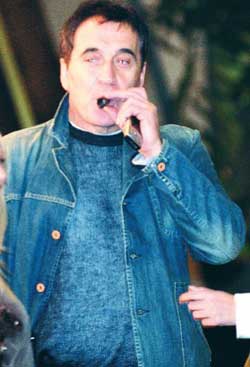 Wanted fugitive drug lord Rodoljub Radulovic met with Ivica Toncev at the Hyatt Regency Hotel in Belgrade.
Wanted fugitive drug lord Rodoljub Radulovic met with Ivica Toncev at the Hyatt Regency Hotel in Belgrade.
According to the report, Tončev met in 2009 with drug lord Radulović, an important member of Darko Šarić’s drug gang, who is allegedly engaged in international cocaine trafficking from South America to Europe. In mid-2012, OCCRP/CINS published a series of stories on Radulović, exposing his role in the international drug business. Confidential documents of the British Serious Organized Crime Agency (SOCA) published by OCCRP/CINS identify Radulović and Šarić as leaders of a drug cartel that in 2009 planned to smuggle tons of cocaine on board ships carrying cement and sugar. In October 2012, Radulović was indicted by the Serbian office of the Prosecution Office for the Fight Against Organized Crime for participating in the delivery of 1.8 tons of cocaine, hidden as soybeans, from South America to Europe in April 2009. He has since disappeared.
The intelligence report shows that Tončev and Radulović met that same April, the same month the drug laden soybeans were being shipped, in Belgrade’s upscale Hyatt RegencyHotel where Tončev is a regular visitor.
Radulović’s son Đorđe and an Italian businessman named Andrea Bartolazzi also attended the meeting.The report states that they discussed “business arrangements worth €2 million in the area of Surdulica,” Tončev’s hometown. The report does not specify what kind of business they discussed.
Bartolazzi and Tončev both told OCCRP/CINS that the meeting was related to the energy business.
Bartolazzi told reporters he is aconsultant in the wind energy business and the men were potential investors. “They asked me to explain to them regulations and how the business works,”said Bartolazzi. He did not remember the names of the people he met.
Tončev said he didn’t remember how Radulović contacted him – directly on his phone or through government – but that he only met him that once.
He said he didn’t know Radulović was engaged in drugs and neither was he interested. “I will meet with anybody who wants to invest in Serbia, with anybody.”
Tončev said the meeting was short because he was not the right person to talk to. “I told them to speak with the [energy] minister. … And then I stayed five more minutes for coffee with them, as a courtesy.”
Prime Minister Dačić publicly said at a press conference in February that he met Radulović during November and December 2008, while he was minister of interior, but like Tončev, he said he didn’t know Radulović was a criminal.
Tončev said he believed the Serbian Intelligence Agency obtained a video of the meeting from the hotel. A police source confirmed the video was in the hands of police and said it was part of a wide-reaching probe into Šarić gang ties to politicians being conducted by the organized crime prosecution office.
An Old Friend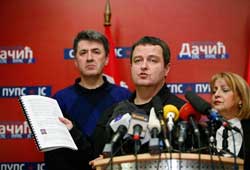 Dacic speaks at a press conference about his meeting with Rodoljub Radulovic.
Dacic speaks at a press conference about his meeting with Rodoljub Radulovic.
The intelligence report also says Tončev is a long-timefriend of Nenad Milenković –whom police arrested for heroin trafficking but never charged.
The court issued a warrant for Milenković in 2003 during Operation Saber, a police action undertaken after the assassination of Serbian Prime Minister Zoran Đinđić, when police rounded up thousands of known crime figures. He was picked up in Bulgaria in July 2003 and extradited to Serbia in the next year but was never charged.
The report states that Tončev and Milenković have been friends for many years and were meeting regularly in Belgrade and Surdulica including visits to each other’s homes. A police source confirmed their relationship to OCCRP/CINS.
Tončev,however, said Milenković was an acquaintance from his home town and not a friend.
“I know him from Surdulica, and not Belgrade,” said Tončev. “In Surdulica, there is nobody who does not know me. … It’s a small place. But I never sat with Milenković.”
OCCRP could not confirm other parts of the intelligence report that Tončev met or had contacts with other well-known criminals.
Celebrity Mafia
OCCRP/CINS reporters obtained a photograph of crime figure Boris Petkov with his arm around a young Tončev. Petkov, known as the ''Bulgarian'', was one of most well-known criminals in Serbia and was born in the area surrounding Tončev's hometown.
According to the Serbian police’s white book, Petkov was amajor smuggler of heroin from Turkey and Bulgaria to the EU and had close ties to several crime groups.
Petkov was one of Serbia’s first celebrity mafia figures appearing regularly in the press. At one point he gave an interview to the documentary program ''See You in the Obituary'' where he bragged that he was one of the first from his generation who was “shooting”.
According to media, he was sentenced to five years in prison for his role in the murder of a criminal adversary. He died in 2002.
Tončev said the photo was taken while he was still a teenager, before he moved to Austria.He said he knew Petkov from his home town.
“In the 90s (in Serbia) everybody was a major criminal,” said Tončev.“It is just one photo with him. So what?”
Dačić Warned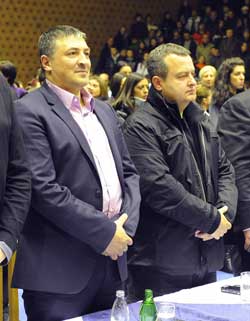 Ivica Toncev is a close advisor to Prime Minister Ivica Dacic.
Ivica Toncev is a close advisor to Prime Minister Ivica Dacic.
The report states that Tončev threatened Nebojša Ćirić, telling the then state secretary of Economy and Regional Development of Serbia that “bad things” could happen to him if he interfered with the privatization of certain companies by friends of Tončev.
A former Serbian government source confirmed the allegation saying the threat came at a September 2009 meeting in restaurant Franš in Belgrade. Ćirić complained to his superiors and the issue was solved. Ćirić would not comment on the allegation to OCCRP/CINS. Tončev denied the threats and said Ćirić misunderstood him.
“Maybe I raised my voice or something, but it was not a threat. … Who was I to threaten him?’’ Tončev said.
Dačić also was warned by several diplomats about Tončev’s criminal connections before he appointed him to his staff a second time after the 2012 election, according to the report and confirmed by several sources.
American and Russian embassy officials expressed their concern about Tončev holding such an important position. Other European embassies including the French, German and English expressed similar concerns. Dačić seems to have ignored them. At the time of this story, Dačić had not returned messages seeking comment.
Tončev said he never heard this complaint, except from then Russian ambassador Aleksandar Konuzin. Tončev said Russian opposition stemmed from his help to workers who were protesting against a Serbian company privatized by Russian owners.
Tončev disagrees about whether he plays an important role in government and Dačić’s Socialist Party of Serbia where, according to the party’s website, he is in charge of party finances. The position is important in Serbian politics because it controls who funds the party and has influence over it. He is also vice president of Red Star football club, one of the major teams in Serbia.
Tončev said he never took over the finances despite what is written on the website because the finance committee was never formed. He also said he has no influence over the police and secret service and does not have access to sensitive information of interest to the mafia.
“Everybody thinks I am the person who is in charge. That’s why I am sitting here with you having all these problems,” he said.
Why CINS and OCCRP published the report?
OCCRP and CINS were given access to the report earlier this year. OCCRP’s policy is normally not to publish files with intelligence information unless there is a compelling public interest to do so. The fact that a high member of the Serbian government was involved, according to an intelligence report, in organized crime seemed to editors to meet this test.
OCCRP and CINS set out to substantiate every claim in the report. Reporters talked to a number of high level government agencies who were in a position to know and many verified the information in the report. We talked to law enforcement, business people, members of the public and a number of crime figures. We verified every factpossible throughpublic records. We found no information that could be proven to be inaccurate. Anything in the report that could not be verified was left out of this story. There were many other less significant allegations in the report and information of a personal nature. OCCRP and CINS are not publishing that information.
